The Rhizome Experience
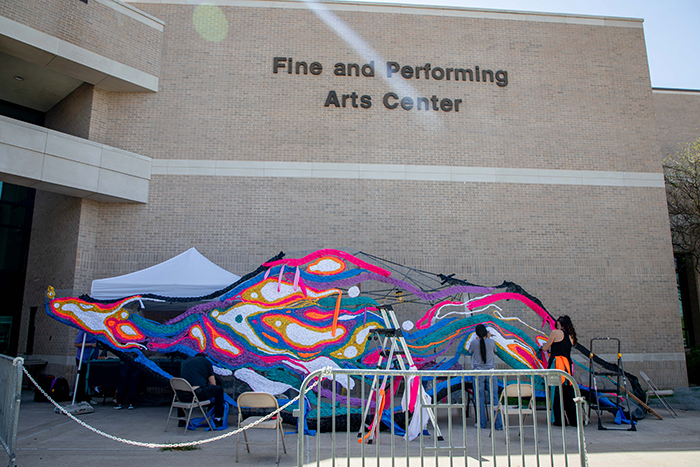
The Rhizome Experience is a free, large-scale, multidisciplinary contemporary art project organized by Artist and Visiting Assistant Professor Crystal Wagner. It represents a collaboration between faculty and students in the music, art, dance, theater, and humanities and the community. Together, we’ve created a fully dynamic, immersive experience in art, culture, community, place-making, and sustainability. Join us and be part of a historic undertaking at TAMIU and in Laredo...the like of which has never been seen before!
Rhizome Series of Events - April 12, 2024
| Activity | Composer(s), Dancer(s), or Performer(s) |
|---|---|
| Sound Piece | "Enochian Ballad for the Liminal" Diego Martinez |
| Introduction | Crystal Wagner |
| Theater Piece | Performed by Gilda Caballero de Flores & Students |
| Poetry Reading | "The Forest" by Mark Gutierrez |
| Piano Piece | Dr. Friedrich C. Gechter |
| Musical Composition | "Crystal Cloud" Performed by Dr. James A. Moyer, Dr. Yu-Mei Huang, and Dr. Jiyeon Hwang |
| Dance Piece | Timothy A. Rubel Choreography & Dancers |
| Musical Composition | "Chrysalis" Matthew D. McVinnie |
| Clarinet | Dr. Javier A. Elizondo |
| Organ | "Sequential Rise (Improvisation)" Performed by Dr. Colin A. Campbell |
| Musical Ensemble | Juan Capetillo & Fellow Students |
| Sitar Piece | "Growth: An Improvisation in Raga Yaman" by Dr. Emily C. Vanchella |
| Trumpet Sound Piece | "Nodes for Unaccompanied Trumpet" Performed by Dr. Michael W. Mann |
| Mariachi Piece | "Mexico de Noche" Performed by Carlos J. Castañeda Lechuga & Students |
| Ballet Folklorico | Performed by Nayeli Lopez-Diaz & Students |
FPA Art Faculty : Emily Bayless, Josias Figuerido, Julio Mendez, Jesse Shaw
FPA Staff : Matthew D. McVinnie, Laura R. Moran, Elizabeth Jones Rubio
Special Thanks to all the volunteers and participants who helped bring Rhizome to life!
Special Thanks : Dr. Jude Galbraith & Julian Pena for their contributions.
Special Thanks : Professor Jessica Walker & to the judges of the Rhizome Poetry Contest, Dr. Manuel Broncano & Jose Cardona-Lopez

What is Rhizome @ TAMIU?
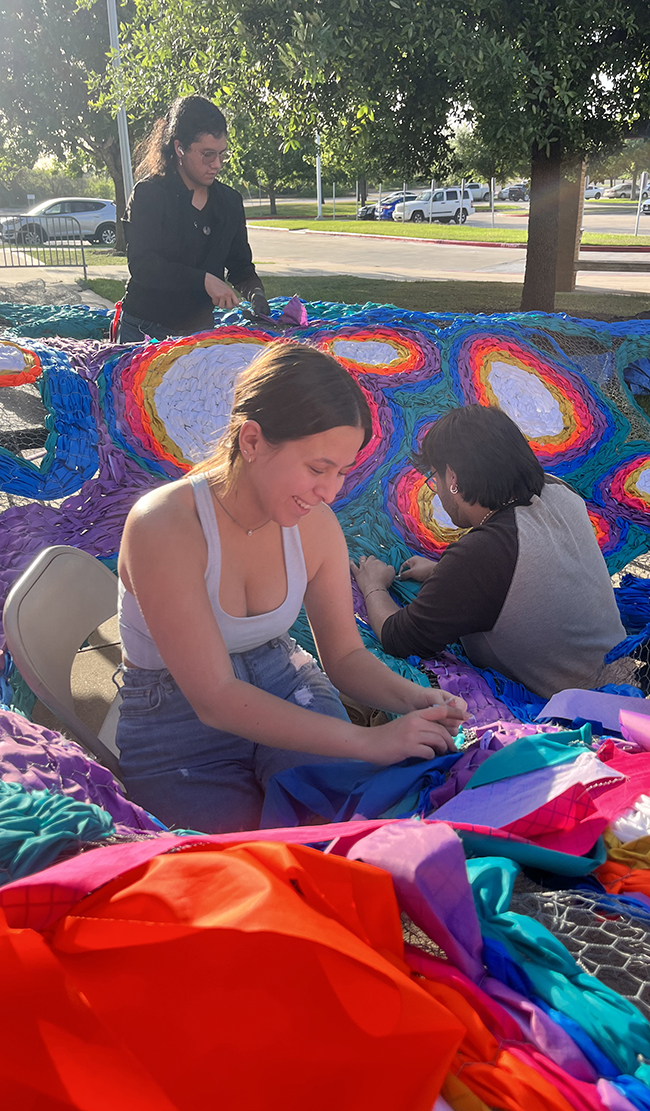
“Rhizome” is a multidisciplinary contemporary art project organized by Texas A&M International University (TAMIU) Artist and Visiting Assistant Professor Crystal Wagner that will be created on campus in Spring 2024. It involves the collaboration between faculty and students in the music, art, dance, theater, and humanities and the community at large.
Partial sponsorship provided by

Donate to Rhizome at go.tamiu.edu/SupportRhizome
How was Rhizome Made?
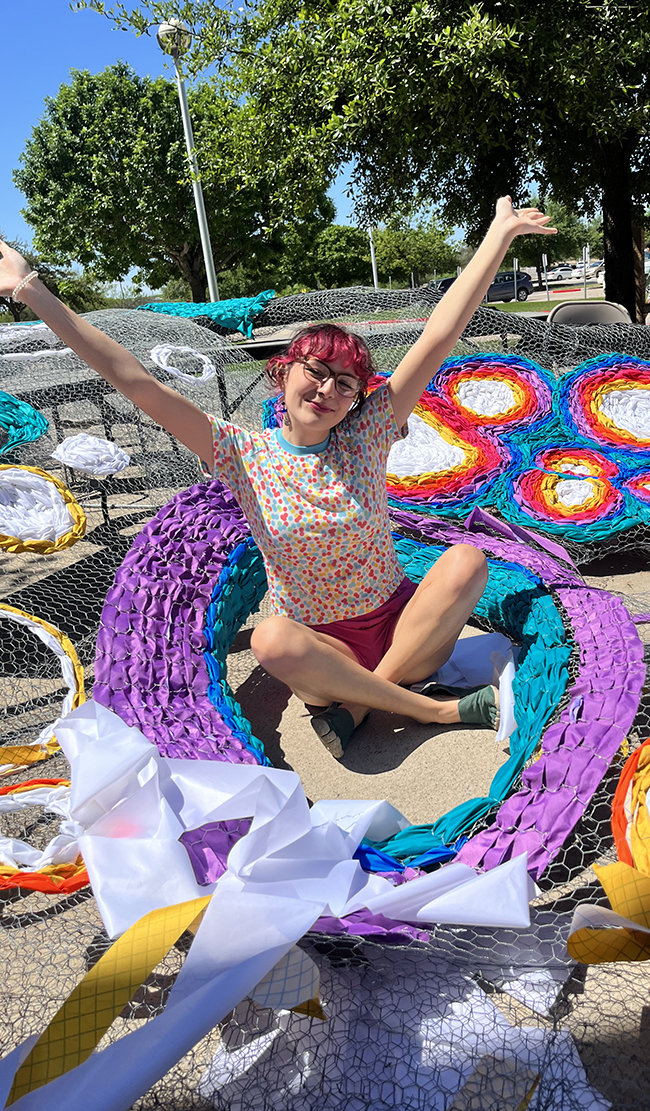
Through Collaboration & Engagement: “Rhizome” was open to collaborations from all TAMIU Colleges/Schools and Departments to create a fully dynamic conversation on art, culture, community, place-making, and sustainability.
Rhizome uses RPET fabric made from recycled plastic bottles, and the installation explores sustainability and awareness at the intersection of art, environmentalism, and community. Rhizome uses recycled materials and harnesses solar energy to generate power. Rhizome transforms RPET fabric into ART and then into REUSABLE TOTE BAGS. It establishes a bridge between different communities through collaboration and becomes a net producer to reduce waste in the community.
Who Is the Artist, Crystal Wagner?
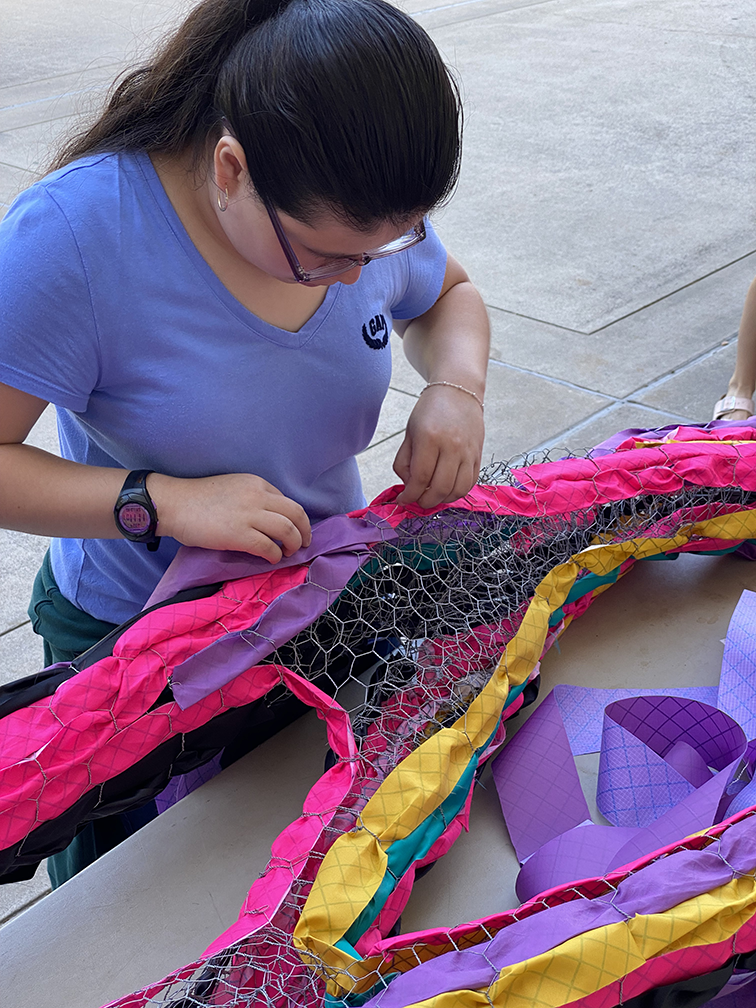
Crystal Wagner is a contemporary interdisciplinary artist represented by Mirus Gallery in Los Angeles/San Francisco, Ryan Joseph Gallery in Denver, CO, Kirk Gallery in Denmark, and David Block Gallery in Marrakesh, Morocco.
She received her MFA from the University of Tennessee in 2008, her BFA from the Atlanta College of Art in 2004, and her AFA from Keystone College in 2002. In 2013 she was awarded the highly coveted Pollock-Krasner Grant. Wagner’s interest in combining two-dimensional and three-dimensional forms, alternative use of materials, hybrid approaches to printmaking, and massive site-specific installations, have led to her artwork being exhibited extensively in the U.S. and around the world.
Notable commissions include a large-scale installation for the internationally recognized band The Flaming Lips, a large-scale installation piece for NIKE, presented in the Shrine Auditorium for The KOBE X Blackout Experience, Bombay Sapphire, TOYOTA, and two installations for Viacom, one of which is at their headquarters in Times Square, featured by The New York Times and broadcast on national television on VH1’s Top 20 Countdown, The United States Embassy, and most recently a large-scale installation for Warner Brothers, Grammy Museum, Los Angeles, CA.
Her work has been featured by Architectural Digest, Artnet, Hi-Fructose Magazine, Juxtapoz Magazine, Graffiti Art Magazine, Arrestedmotion.com, ArtAttacks Online, Art & Science Journal, Inspir3d.com, Complex Art & Design Magazine, Chrome Yellow Magazine, Catapult Art Magazine, My Modern Met, and Beautiful Decay Magazine, among others.
What is the Artist Saying?
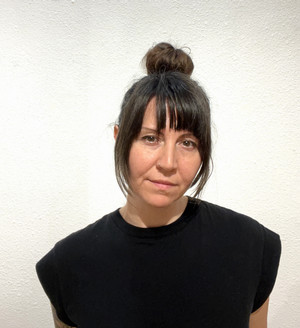
My works, both micro and macro, dimensional and flat, explore the sensory deprivation associated with this new relationship between human beings and forms and structures found in the natural world.
Crystal Wagner
Artist/Visiting Assistant Professor at Texas A&M International University
“I am interested in the increasingly severe divide between human beings and the natural world. As people become more immersed in their modern landscapes and technologies, their relationship with the world outside of their cultivated spaces becomes more unfamiliar. David Abram's explains in his book, Spell of the Sensuous, that we are “Caught up in a mass of abstractions, our attentions hypnotized by a host of human-made technologies that reflect only us to ourselves.”
My works, both micro and macro, dimensional and flat, explore the sensory deprivation associated with this new relationship between human beings and forms and structures found in the natural world. The works respond to the disenchanted spaces and materials that people occupy daily as they move through the artifice of urban topology. Rooms, buildings, sidewalks, cars, and computers are just tiny elements of a greater landscape that people have cultivated to be their experience with the world they live in. The more immersed they become in this artificial landscape, both physically and psychologically, the more anomalous forms and structures found in nature appear, making nature more alien, more foreign, and more exotic.
My installations are hybrids between manufactured materials and organic forms and structures. These immersive worlds explore sculptural landscapes and environments created site-specifically with ripstop nylon or tablecloth in combination with hex netting. They are temporary 'happenings' that grow using architecture as the substrate. They explore the dialog between consumer culture, artifice, and what it feels like to walk through an environment.
I consider things like the parade floats, graffiti, plastic plants, and piñatas among others, as attempts human beings make to amplify their everyday spaces/objects in reaction to this sensory deprivation. I scrutinize and celebrate the plastic plant, painted bright green, as a stand-in for something living, and the neon streak as something beautiful. In both my large-scale works and my smaller paper sculptures, I pull from textures and shapes from seemingly otherworldly sources, but all the work I make is deeply rooted in the visual and sculptural ecological language of exotic flora, fauna, micro and macro-organisms and the rhizomatic growth that exists as the foundation for all living things.
As this sense of space and emphasis on the physical realm becomes supplanted with the binary, the unreal, and the synthetic, people’s familiarity and awareness of forms and structures found in nature both large and small are beginning to atrophy."
